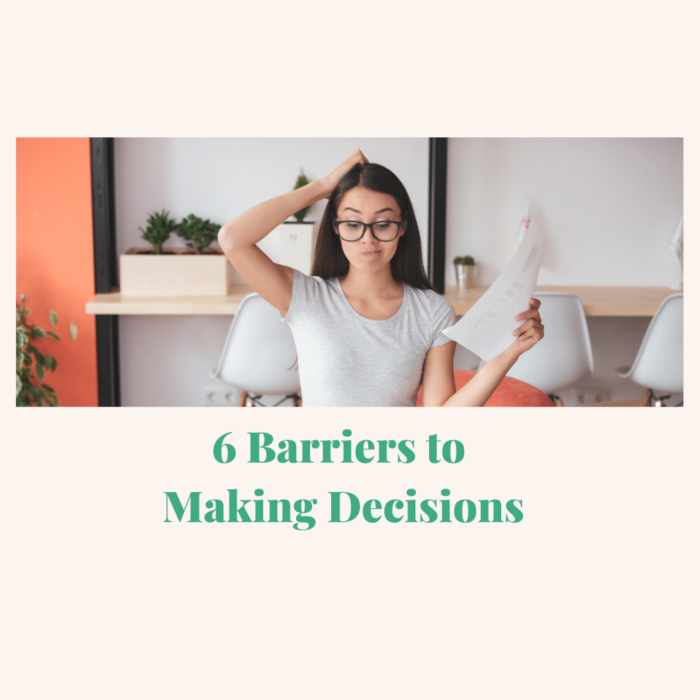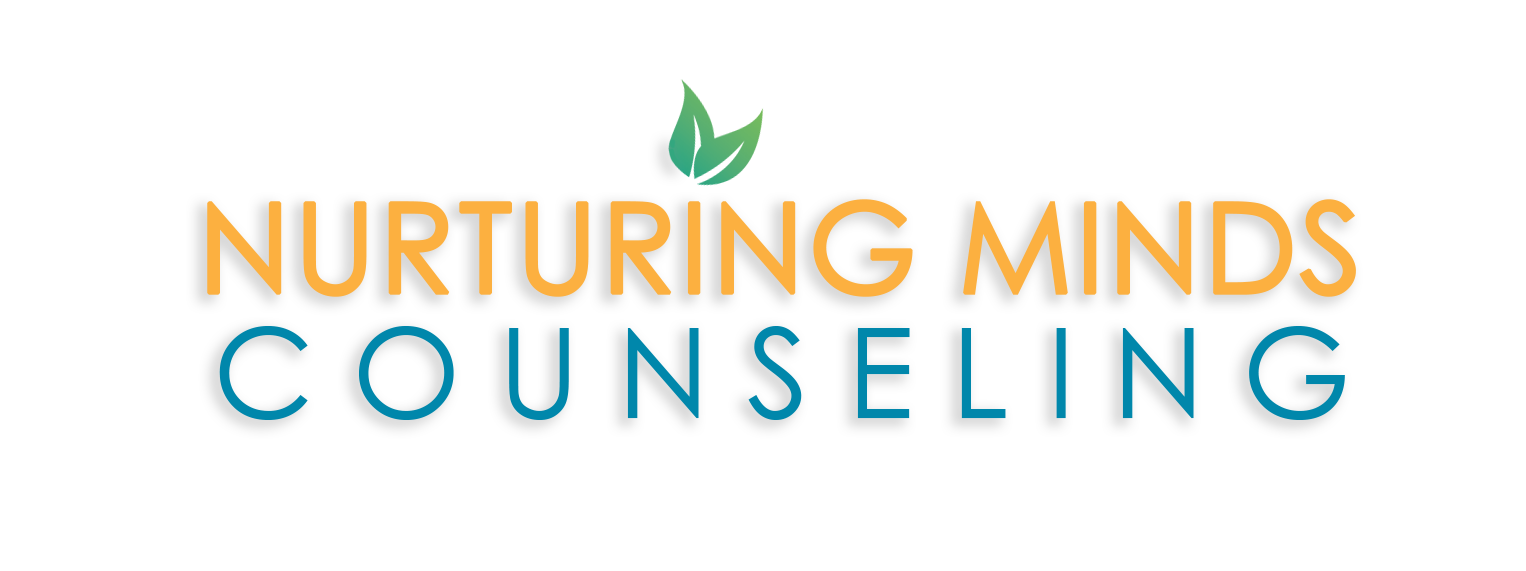6 Barriers to Making Decisions

Are you trying to make a decision, but you keep getting stuck? Well, in this blog I review six common barriers to making decisions.
Table of Contents
Watch Video: “6 Barriers to Making Decisions”
Read blog on “6 Barriers to Making Decisions”
1st Barrier – Analysis Paralysis
This is where you start to overthink a decision and not take action which. I always talk about the difference between helpful planning, so when I say helpful planning, it’s helpful to a certain degree when you’re making a decision to gather information. If there’s something that you don’t know, especially if it’s a decision that’s outside of your expertise, you might be trying to plan through it and strategize.
That’s great, but when it comes to a certain point where you know as much as you’re going to know, you’re going to have to accept that. You keep trying to go over it, explore your options, and think of additional ways to problem solve. That’s an indication that you’re going through analysis paralysis. If you recognize that that’s the stage that you’re in, then you’re going to have to reign it back and determine what is keeping you stuck. However, at this point you have as much information as you’re going to have in order to make this decision.
2nd Barrier – Perfectionism
There could be some perfectionism going on. Generally, when I talk about this it’s this sense of having these high standards and the sense of wanting. What is the perfect decision and does that even exist? I’m sure your mind might tell you it does exist, but when I say perfectionism, this perfect decision is in your mind. This is also related to analysis paralysis, but it’s this fear of making a mistake. You’re trying to be flawless and you don’t want to make any mistakes, so the fear making mistakes is keeping you stuck.
If that is what is happening, I usually encourage clients to do some of the work around making mistakes. Acknowledging that making mistakes is normal and we all make mistakes. Mistakes are allowed and, if anything, mistakes can be a great learning opportunity. I know when I say that, my clients still think along the lines of ‘Yeah, I don’t need that learning opportunity. I would just rather not make a mistake.’ I get it! If I could, I’d love to make decisions in my life that always turn out exactly the way I want. It helps to try to be comfortable with making the mistake and acknowledging the thoughts and the feelings that show up when you think about making a mistake. It is also helpful to think about other instances in your life where you made a mistake. This could also be what is contributing to your need to work through those past mistakes and start to lean into the confidence that you can make decisions.
3rd Barrier – Unable to Cope with the Feelings
The third barrier is being unable to cope with the feelings that are showing up when you’re thinking about making this decision. When worrying about it, it’s helpful to start to understand what the feelings are that start to show up when you think about this decision and all the potential outcomes. When you think about one outcome, what do you feel when you think about another one? What are you feeling or, even as you’re thinking about making a decision, what is the feeling that’s showing up and where does that show up in your body?
Sometimes, when we can’t cope with the emotions or when our emotions are getting in our way and clouding our judgment, us making a decision that’s based on our values is better than being impulsive or being angry. It’s helpful to understand that your emotions are at play when trying to make this decision, so I’d encourage you to identify what those emotions are. Are these emotions sending you messages or are they just keeping you stuck?
4th Barrier – Too Much Outside Noise
I’m guilty of asking different people that I trust in my life at times when I have a decision about their opinions which, can be helpful sometimes, but I also realize sometimes it just might keep me stuck. This is because I can’t drown out the outside noise to know what’s ultimately what feels right for me or, at least, the best for me in that moment. So, if that’s something you’re struggling with, I would encourage you to think about that especially if you have any people pleasing tendencies.
If you are prone to want to get other people’s opinion, that you don’t want to disappoint other people, you may start to lose a sense of what you want in other people’s feedback. That can be confusing and distracting, so it might be taking a period where you don’t ask anybody else. Try to drown out that outside noise and sit with yourself with some moments of quiet reflection to try to think about what it is about this decision and what you ultimately want.
It’s helpful to think about some of your values and what the values are that are important to you. When you think about an outcome that feels ideal, what are the ways that you want to show up and the qualities that you would embody? Values can be a good way to help us to know what’s important to us when we’re facing a decision.
5th Barrier – Decision Fatigue
I read a study that said that humans can make about 35,000 decisions in a day. They can be minute decisions such as what are you having for breakfast, what color shoes you are going to wear, etc. Either way, we’re making so many decisions throughout the day that we can then fall prey to decision fatigue. Or, at some point, we’re overwhelmed, tired, made too many decisions, so we don’t have the internal resources to dedicate to this new decision.
However, this decision still has to be made so, if that’s the case, I’d encourage you to think about when you’re making this decision. If you’re trying to make this decision after you’ve had a stressful day, you have to allocate your internal resources like thinking about it managing the feelings, having conversations with partners or family members, whatever the case is. You just don’t have the internal resources to do it, so you procrastinate, you get stuck again in analysis paralysis, you’re just trying to make an impulsive decision, or you get stuck in indecision.
If you do notice that, it’s also helpful to clear out a day or a chunk of your day, depending on how important this decision is. Give yourself some space to make this decision with a clear mind. If it’s also something that isn’t as important, it’s helpful to start to get better at just making them routine or just being more comfortable with the cost. Sometimes we can get stuck on a decision where the cost isn’t that big, yet we’re spinning our wheels for no reason. If it is a decision that’s much more important, then you should take your time to think about it and work through it.
6th Barrier – Risk Averse
The last barrier is when you are risk averse. This means that you just don’t like taking risks because there is that sense of uncertainty, tolerating that uncertainty, and the potential risks that come with making a decision might be highly uncomfortable for you. Trust me, I get it. When I was making the decision to go full time at my private practice, to go from a stable paycheck to all in on this business, there was a part of me that was averse to the outcome. I need a paycheck to pay my bills like most of us, so if there’s a certain risk involved with the decision, we can get stuck.
It’s helpful to acknowledge which side of risk you tend to lean on. Being averse to risk means that you’ve been careful and you’ve planned things out, or you’ve prevented some consequences in your life from happening because of it. If you have to make a decision where the payoff would ultimately be worth it to you, then you have to start to get comfortable with the fact that you’re going to be uncomfortable with the risk. That’s not ideal and, in a perfect world, we could plan everything out to make sure that we know what the outcome is going to be, but there is going to be a level of uncertainty.
Download my decision-making guide and look at the notes below to see how so you can start to move through some of these barriers. If you want to get more tips, book recommendations, and exercises to improve your mental health straight to your inbox, signup for my email newsletter below. As always, I encourage you to continue nurturing your mind, body, and soul, whatever that looks for you!
